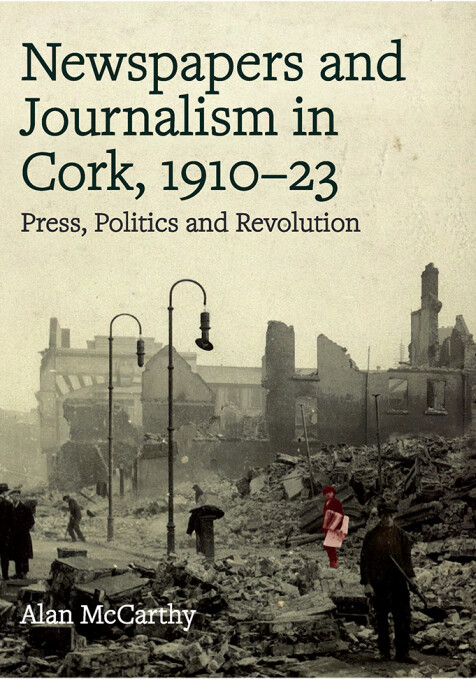Newspapers and Journalism in Cork City and County, 1910-1923
Press, Politics and Revolution
Alan McCarthy
“In this book, Alan McCarthy has selected four Cork newspapers that can be seen as a microcosm of some of the key political movements of that period. The rivalry between Cork city institutions the Cork Examiner and Cork Constitution, mirrored by the regional papers Southern Star and Skibbereen Eagle, presents an almost unique opportunity to map national politics onto the responses of four local papers, and to see how they adapted, altered or came into conflict with both each other and the main political movements of the day. The introduction convincingly explains why Cork’s history is worth focusing on in this manner, not just because of the battles fought there in the War of Independence and Civil War, but perhaps more importantly the economic and geographic features that shaped these papers and their readers … Each of these papers represented a significant voice of the period: the Examiner held a Redmondite constitutional nationalist position, while the Constitution was unyieldingly unionist. The Eagle took a loyalist position that gave way to pragmatism later in the period, while the Southern Star was radicalised after it was acquired by Sinn Féin, a process repeated across the country ... The first chapter in particular provides an interesting account of the day to day operations of a newspaper in this period, detailing the backroom and boardroom operations, how proofreaders came to be promoted and how a newspaper might deal with financial loss. This chapter sets out how important the press was to the lives and opinions of the local communities it served, while also illustrating the centrality of the journalists and staff to public events. This is important to set the stage for the later years of the period, when both British and Republican forces frequently targeted newspapers and the printing presses, as well as the staff themselves, in order to prevent information being disseminated … there is much about this book to recommend it. In particular its detailed exploration of the unionist press in what is now the Republic of Ireland is a welcome corrective to the existing historiography which has tended to ignore such voices.” Brian Ward, Irish Studies Review 2021 (29/2)
“a book that charts sabotages, shootings and shortages in the Cork papers doing the War of Independence … Newspapers and Journalism in Cork, 1910-1923 goes beyond the many instances of sabotage, censorship and enforced newspaper closures to detail other challenges that faced publishers, such as industrial unrest and wartime paper shortages. McCarthy delves deep between the lines printed in more than a dozen titles in the rebel county before, during and after the War of Independence to explain the political affiliations of the owners, but also those too of their reporters, printers and even their newsboys. Although none lost their lives directly as a result of their work in the War of Independence, several of Cork’s newsmen – for it was an almost exclusively-male sector - were killed, abducted, arrested or otherwise targeted … With his evidence of political messaging, military censorship and enforced editorial insertions, McCarthy suggests a cautious approach to the use of online newspaper archives by those compiling family or local histories. Distinguishing news from misinformation is clearly not a skill that first became necessary in the internet age.” Niall Murray, Irish Examiner (2nd October 2020)
“New Book offers an insight into the local media during a volatile time in Irish history … A fascinating new book by Charleville author Alan McCarthy has delved into the media and the key role it played in shaping and reflecting public opinion during arguably the most turbulent period in modern Irish history ... In addition to addressing the obvious challenges of censorship, sabotage and enforced closures the book, perhaps most importantly, delves into the lives of the people behind them - the newspaper owners, editors, journalists and news boys and their stories … Rather than simply showing how newspapers highlighted the issues of the day across various shades of opinion and acted as a microcosm of the conflicts and disputes that engulfed Ireland, the book delves into the lives of the people behind them and the manner it which they responded to censorship and repression.” Bill Browne, The CorkMan, 13th October 2020


